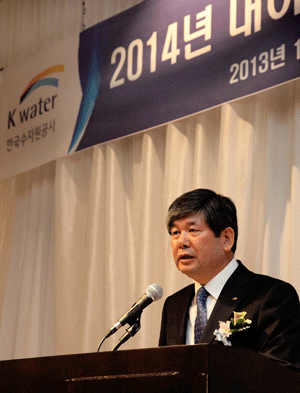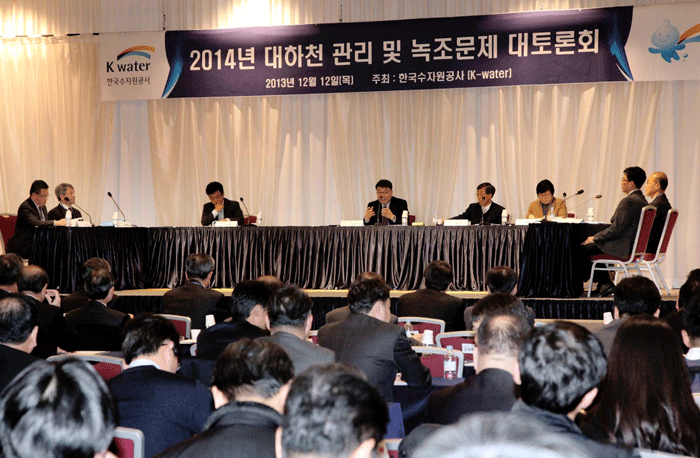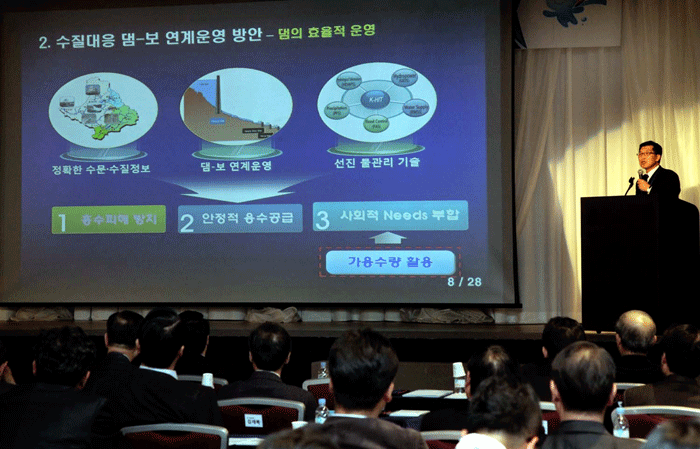K-water hosts a grand debate
on algae blooms in the streams
Amid reports that people are increasingly concerned about algae blooms in major rivers, K-water (Korea Water Resources Corp.) declared a policy shift in water management. K-water will act “proactively” to control algae growth in rivers and lakes in Korea. “K-water, which is responsible for management of multiple dams and weirs, will take a more proactive approach to the problem of algae growth, departing from its passive attitude,” said Choi Gye-woon, President & CEO of the water resources management agency. He made these remarks during a “grand debate” on how to improve the management of water resources held at Seoul Education and Culture Center in southeastern Seoul under the sponsorship of K-water on December 12, 2013.

“Armed with a strong sense of responsibility, we will try to find ways which are effective in the control of algae growth through co-management of dams and weirs,” Choi said. “We will also capitalize on information communication technology(ICT) to effectively monitor water resources in real time,” thereby getting rid of the public concerns about the safety of water resources.”
K-water sponsored the debate in an effort to find solutions to the growing social issue, algae blooms in rivers and streams. Some 300 people including the government’s environment officials and environment activists took part in the session. Among them were Lee Young-ki, chief of Water Environment Policy Division of Ministry of Environment; Min Kyung-suk, professor of ecology and environmental science at Kyungpook National University; Huh Jae-young, professor of civil engineering at Daejeon University; and Lee Jeong-soo, secretary general of Green Future.
A round-table debate was presided over by Prof. Kim Sung-soo of Yonsei University and participated by several officials of the Ministry of Environment and K-water and other environmental entities.
Prof. Min Kyung-suk of Kyungpook National University stressed that measures should be implemented to prevent inflows of nitrogen and phosphorus that trigger algae outbreaks in rivers and streams. In this regard, he called for a shift in related government policies.
Prof. Huh Jae-young of Daejeon University said that it is necessary to reinforce the monitoring of water quality in order to determine whether there have been changes in the environments of rivers and streams due to the massive Four-River Project. After this is done, he said, proper water resources management measures should be implemented.
Lee Jung-soo, secretary general of Green Future, said: “The government says there is no problem to the safety of piped water due to reinforced water treatment, but people’s fear of water contamination persist. K-water and the government need to push for drastic changes in the management of water quality.”
The administration of former President Lee Myung-bak has undertaken the Four River Project aimed at enhancing the nation’s water management system as well as preventing flooding in the four rivers ― the Han, Nakdong, Geum and Yeongsan. But the mega-budget project has been under fire for its possible adverse effects on the environment, especially worsening of the water quality of the major rivers.
Environment experts said that algae blooms are caused by a number of factors, including an excess of nutrients, particularly phosphorus and nitrogen, high temperature and extended periods of weak water circulation.
Of late, rivers and streams are increasingly becoming space for amenity in which people and nature coexist. As such, people are gaining easy access to rivers and streams. However, people’s concerns about algae blooms in rivers are growing. Since the environments of rivers and streams have been altered since the completion of Four River Project, social demand is increasing that K-water should play a more responsible role in handling the algae problem, departing from its passive attitude. This is the reason that K-water hosted the debate to find solutions on the algae problems, along with systematic management of dams and weir.
Three officials of K-water presented papers on the management of water quality, water resources and weirs. In a report on how to improve water quality to prevent algae growth, Kim Jin-won, a senior official of Dam & Watershed Maintenance Department, suggested a set of measures to improve the management of water resources to prevent algae growth in rivers and lakes.
He suggested it is necessary to reinforce the monitoring of water quality in upstream dams, weirs and lakes. “An integrated water quality forecasting system is in need to proactively respond to the occurrence of green algae in rivers, especially the four major rivers,” he said. He called for intensive search on the causes of algae growth.
Chung Koo-yeol of Water Resources Maintenance Center reported on how to improve the management of waters of rivers and streams through co-management of dams and weirs. He said it is necessary to scrutinize the present status of co-management of dams and weirs and seek ways to enhance the system.

Lee Jin-ho, a senior official in charge of weir management, said that K-water is seeking to improve the management of weirs installed at major dams of the four rivers by reinforcing the safety of weirs . “We will also secure the expertise of experts to work out long-term solutions,” he said.
Mr. Choi Gye-woon, 59, served as professor of urban science at Incheon National University before he was inaugurated as president and CEO of K-water on November 5, 2013. CEO Choi, who earned his Ph.D from Colorado State University, served as vice president of Korean Society of Water Resources and co-chairman of Incheon Citizens’ Coalition for Economic Justice.
Between 2010 and 2011, CEO Choi played a significant role in Daegu’s hosting of 2010-2011 World City Water Forum. He served as the Forum’s secretary general. Currently, he leads a research team on the R&D project Smart Water Grid, of Ministry of Land, Infrastructure and Transport.

CEO Choi is expected to make a great contr
ibution toward a successful completion and effective management of the Four-River Project.
In his inaugural address, CEO Choi said that K-water will do its best to resolve “water problems” in Korea and abroad. He said K-water will strive to lead the global water management systems, while striving to energize the water business industry. “Based on our knowledge and expertise, K-water is on the verge of becoming a renowned company in the global water market,” he said.
He stressed that K-water has taken proactive measures to limit the effects of floods, droughts and other water-related disasters to ensure the safety of people’s lives, He stressed that “a new paradigm” must be introduced for the sake of creative water management. “By maintaining mutually beneficial communication with the public, we aim to become the most trusted public enterprises in Korea,” he said.
“

